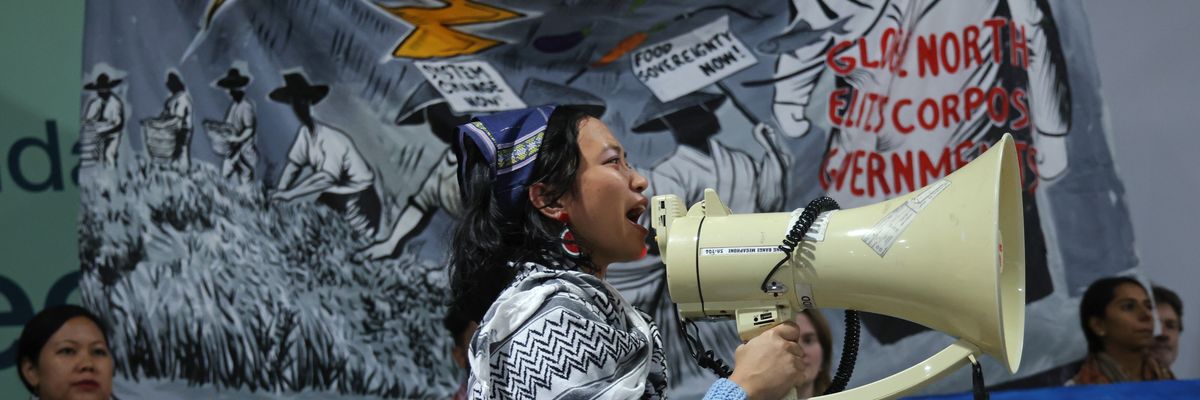As the clock winds down at the UN climate summit taking place in Baku, Azerbaijan, green groups are sounding the alarm Thursday following the release of a draft climate finance deal that they say falls short of what's needed to support climate-vulnerable countries and adequately address the planetary crisis.
"The clock is ticking. COP29 is now down to the wire," said UN Secretary-General António Guterres on Thursday, just a day before the two-week conference is set to conclude.
Finance has been a major focus of this year's summit. Under the 20125 Paris Agreement, countries are supposed to come up with a "new collective quantified goal"—or NCQG in COP jargon—that will govern how much money from rich countries will be transferred to developing countries in order to help the latter cut their emissions and adapt to climate change.
No equivalent climate finance arrangement has been agreed to before, though countries at the summit broadly agree that richer countries, who are responsible for much of historic CO2 emissions, should help poorer and more climate-vulnerable nations deal with natural disasters and their transition to green energy.
The draft text that dropped early Thursday, however, was received poorly.
Oxfam International's climate justice lead, Safa’ Al Jayoussi, said "COP29 must do more than simply repeat the same threadbare promises. Rich countries have spent decades now stalling and blocking genuine progress on climate finance. This has left the Global South suffering the most catastrophic consequences of a climate crisis they did not create. The draft text scandalously misses the crucial element of declaring a clear public commitment to a new climate finance goal."
Instead of specifying how much annually should be funneled towards developing countries via climate finance, the NCQG draft text displayed "X" in place of any actual figures or monetary commitments.
Oscar Soria, a director at the Common Initiative think tank, told the Guardian: "The negotiating placeholder 'X' for climate finance is a testament of the ineptitude from rich nations and emerging economies that are failing to find a workable solution for everyone."
"By the end of the UN climate talks, we must see at least a trillion dollars in public finance on the table," added Andreas Sieber, 350.org associate director of policy and campaigns. Economists told the summit attendees last week that developing countries need at least $1 trillion annually by 2030 to deal with climate change.
A specific and shared concern from campaigners was the draft text's inclusion of carbon market schemes as a way "to scale up" climate finance. While the draft promotes "high-integrity voluntary carbon markets" and other "instruments that mobilize new sources of climate finance and private finance" as part of the equation, critics have long warned that these market-based approaches are nothing but false solutions designed to benefit corporate investors, wealthier nations, and the fossil fuel industry itself.
"Labelling carbon credits as climate finance—which they are unreservedly not—should be axed from the text or risk creating a dangerous escape route for polluters. The same goes for explicitly allowing investments in fossil fuel infrastructure. This is fundamentally incompatible with the goals of the Paris Agreement," said Laurie van der Burg, Oil Change International's global public finance manager, in response to the draft text.
While Article 6 of the Paris Agreement allows for the international transfer of carbon credits, groups warned the changes in the COP29 draft would dramatically strengthen the foothold of such schemes.
"Shockingly, COP29 is set to agree to carbon markets that are even worse than the voluntary carbon markets," said Kirtana Chandrasekaran, a climate campaigner with Friends of the Earth International. "We know these markets have failed. They are riddled with fraud and they do not reduce emissions or provide finance. Communities everywhere and, in fact, the planet itself is on the line."
Without addressing these concerns, advocates of a meaningful deal at the conference say COP29 is headed for failure.
As 350.org's Sieber argued, paying the "historic debt that rich countries owe will enable all nations to take action on climate at home and meet the collective goal agreed last year at COP28—to triple renewable energy, and transition away from fossil fuels. Right now, we only see cowardice and a void in leadership, ignoring the undeniable science that we can't keep polluting our planet with dirty oil, gas and coal."
"The time to course correct is now—the European Union and other rich countries must stop playing poker with the planet and humankind's future at stake," Sieber added. "It's time to put their cards on the table and commit real, transformative funding—no more excuses, no more delays, it's time."

